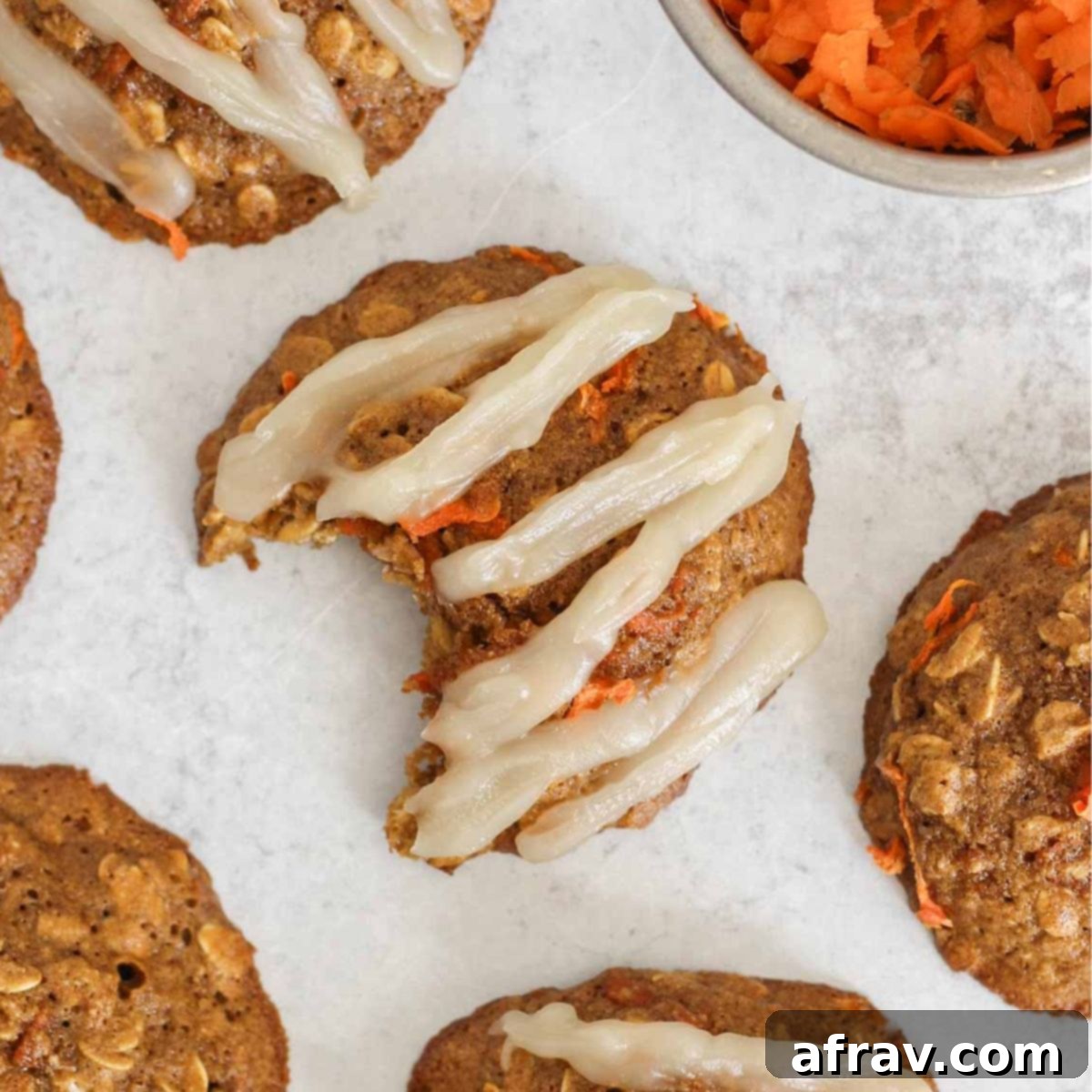Healthy Carrot Cake Oatmeal Cookies: Your Guide to a Wholesome, Gluten-Free Treat
These healthy carrot cake oatmeal cookies are a delightful and wholesome spin on a classic favorite. Crafted with nutrient-rich ingredients like rolled oats, oat flour, and fresh grated carrots, and sweetened naturally, they deliver all the cozy, spiced flavors of traditional carrot cake in an easy-to-make, better-for-you cookie form. Perfect for a guilt-free treat or a healthy snack, these soft and chewy cookies are sure to become a new staple in your clean eating repertoire.
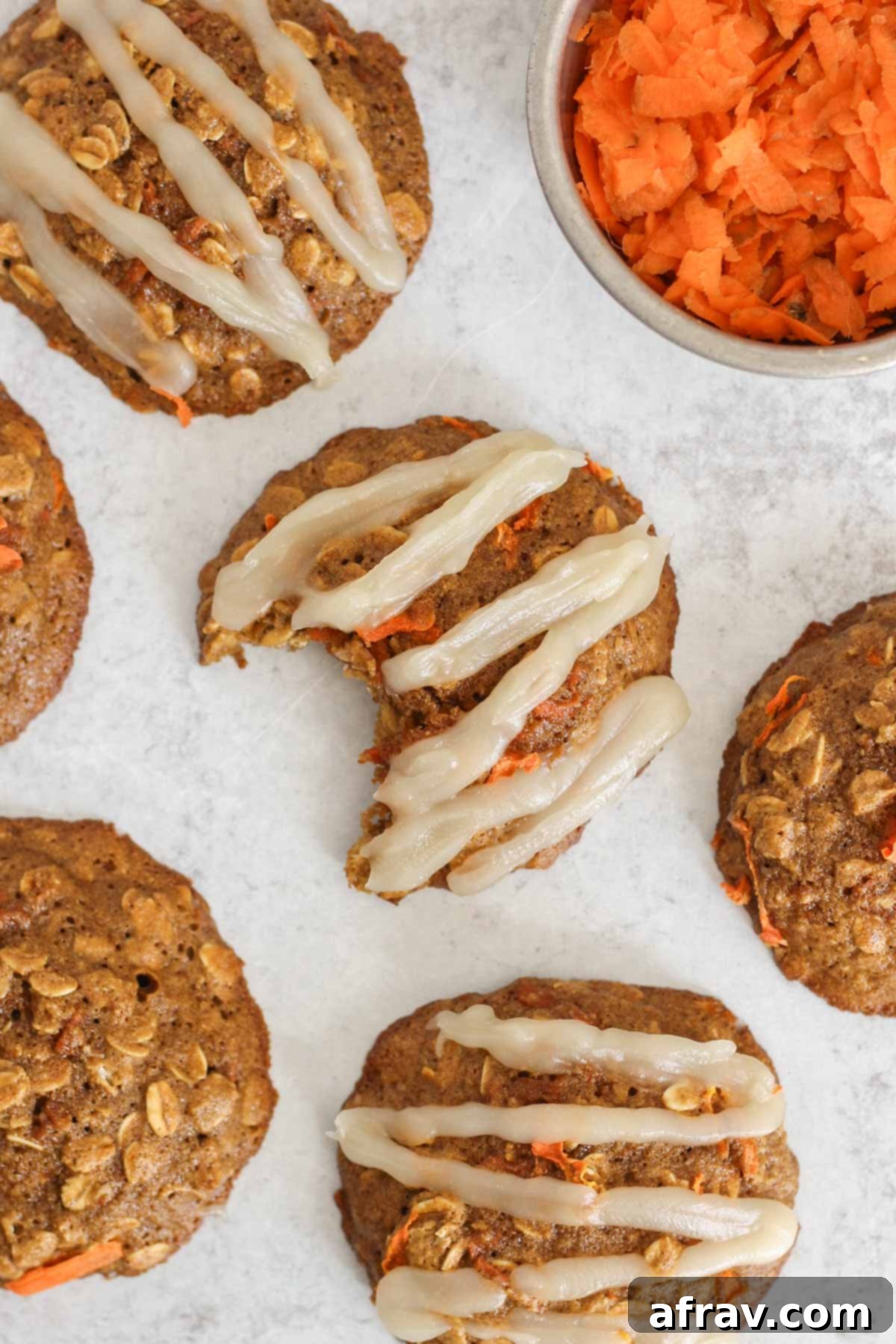
Are you yearning for the comforting taste of carrot cake but seeking a more wholesome option? Look no further! These clean eating carrot cake oatmeal cookies are designed to satisfy your cravings without compromising on your health goals. They offer a perfect blend of indulgence and nutrition, making them an ideal treat for any time of day.
Our carrot cake oatmeal cookies boast a wonderfully soft and chewy texture, brimming with nutritious ingredients. For those seeking a lighter alternative to traditional cream cheese frosting, we’ve included an optional, easy-to-make dairy-free and refined sugar-free coconut butter glaze. However, if you’re feeling adventurous and want to stick to a classic, a rich cream cheese frosting is always a welcome addition – no judgment here, just deliciousness! This versatile recipe allows you to tailor your treat to your preferences.
If these wholesome treats spark your interest, you might also enjoy exploring more of our spring-inspired recipes. Be sure to try my equally delightful carrot cake energy balls for a quick boost, our refreshing vegan fruit tarts, or the deliciously moist almond flour blueberry bread. Each recipe is crafted with health and flavor in mind, providing perfect options for any occasion.
Why You’ll Adore These Healthy Carrot Cake Oatmeal Cookies
These carrot cake oatmeal cookies aren’t just delicious; they’re thoughtfully designed to be a healthier alternative without sacrificing flavor or texture. Here are several compelling reasons why they’ll become your new go-to treat:
- Naturally Gluten-Free & Dairy-Free: We understand the importance of catering to dietary needs. That’s why these cookies are meticulously crafted using ingredients that are naturally gluten-free and dairy-free. This makes them an excellent choice for individuals with celiac disease, gluten sensitivity, lactose intolerance, or those simply looking to reduce their intake of gluten and dairy. Enjoy a delicious cookie without any compromise!
- Sweetened Wholly by Nature: Unlike many conventional cookies laden with refined sugars, these carrot cake oatmeal cookies are sweetened primarily with coconut sugar. Just like my popular oat flour cookies, this natural sweetener provides a rich, caramel-like flavor with a lower glycemic index, making these cookies a smarter choice for managing blood sugar levels while still satisfying your sweet tooth.
- Effortlessly Simple to Bake: Don’t let the delicious complexity of carrot cake intimidate you. This cookie version offers all the irresistible, warm, and cozy flavors of a traditional carrot cake in a much more accessible format. From start to oven, these cookies require only about 20 minutes of active preparation time, making them a perfect last-minute dessert or a quick baking project.
- Irresistibly Soft, Cake-Like Texture: Prepare for a truly unique sensory experience. These cookies are engineered to have a delightful soft and chewy texture that beautifully mimics a cake, yet maintains the convenience of a cookie. It’s truly the best of both worlds – a moist, tender crumb that melts in your mouth, making each bite pure bliss.
Essential Ingredients for Perfect Carrot Cake Oatmeal Cookies
Crafting the perfect carrot cake oatmeal cookie begins with selecting high-quality ingredients. Here’s a closer look at the key components and some important tips for each:
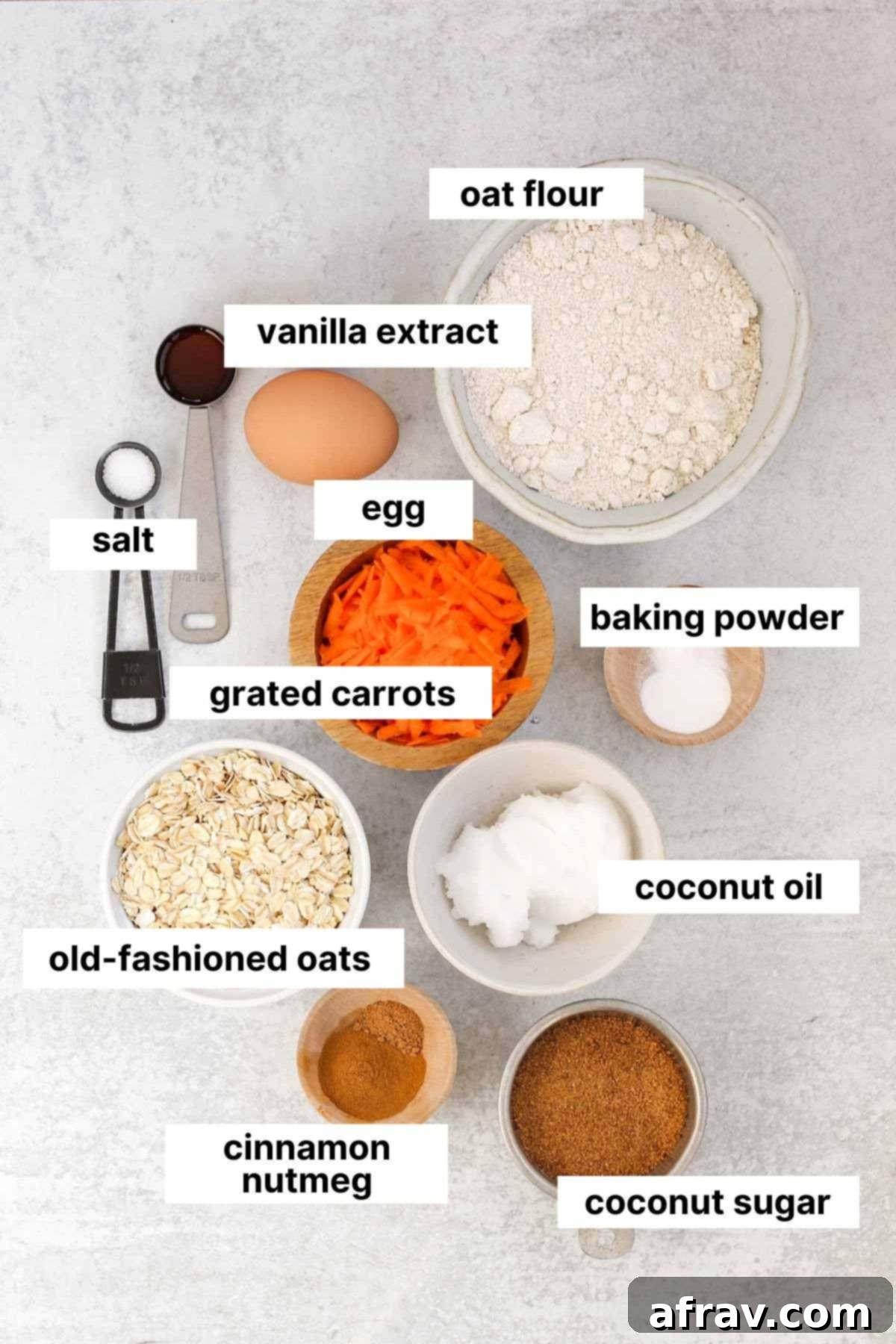
A comprehensive list of all ingredients and their exact quantities can be found in the detailed recipe card at the end of this post. These specific notes will assist you in making the best ingredient selections for optimal results.
- Oat Flour: Oat flour forms the tender base of these cookies. While you can certainly purchase it, I personally prefer making my own oat flour from rolled oats for the freshest taste and texture. **Important Note:** If you are baking for someone with Celiac disease or a gluten sensitivity, it is absolutely crucial to use *certified gluten-free* oat flour. Oats are naturally gluten-free but can easily become contaminated with gluten during agricultural processing and packaging, so look for a clear certification on the label.
- Old-Fashioned Oats: These provide the classic chewy texture and hearty structure characteristic of oatmeal cookies. Ensure you use rolled oats or old-fashioned oats, and *not* quick-cooking or instant oats, as they will yield a different, less desirable texture. As with oat flour, if gluten is a concern, opt for *certified gluten-free* oats to prevent cross-contamination.
- Freshly Grated Carrots: This is a non-negotiable for the best carrot cake cookies! Always use freshly grated carrots, rather than the pre-shredded varieties found in bags. Freshly grated carrots contribute essential moisture to the dough, preventing dry cookies, and they bake much more seamlessly into the cookie structure, integrating their sweet flavor and vibrant color perfectly.
- Coconut Oil: Coconut oil is our dairy-free fat of choice, adding a subtle richness. Both unrefined (virgin) and refined coconut oil can be used successfully. Unrefined coconut oil will impart a slight coconut flavor, which can be lovely in these cookies, while refined coconut oil is more neutral in taste.
- Natural Sweeteners & Spices: Coconut sugar provides a deep, molasses-like sweetness. Combined with ground cinnamon and nutmeg, these spices create that signature warm, aromatic carrot cake flavor profile that makes these cookies so comforting.
Clean Food Tips: To ensure the highest quality and cleanest ingredients, I strongly advocate for using organic oats and oat flour whenever possible. Many conventionally grown grains, including oats, are unfortunately sprayed with glyphosate (an herbicide linked to various health concerns, including increased cancer risk and potential hormone disruption) prior to harvest. Choosing organic helps mitigate exposure to these chemicals. Additionally, while unrefined coconut oil is generally considered the “cleanest” option due to its minimal processing, some brands, such as Nutiva, employ natural and less harsh processing methods for their refined oils, offering a good compromise if a neutral flavor is preferred.
Customizing Your Cookies: Substitutions & Delightful Add-Ins
One of the joys of baking is the ability to customize a recipe to suit your dietary needs or personal preferences. These carrot cake oatmeal cookies are incredibly versatile!
For my friends who are **not gluten-free** and prefer traditional flours, you can easily substitute the oat flour with a wheat-based flour. Excellent choices include heritage grains like Einkorn flour, which offers a slightly sweet flavor and a more digestible gluten structure, or a high-quality organic whole wheat flour for a robust, wholesome flavor. Just ensure you measure by weight if possible, or use the “spoon and level” method to avoid over-measuring.
Similarly, if you **are not dairy-free**, feel free to swap the coconut oil with an equal amount of melted unsalted butter. Butter will add a classic rich flavor that complements the carrot cake spices beautifully. Ensure it’s fully melted but not hot when adding to the wet ingredients.
To enhance the classic carrot cake experience, consider these delicious add-ins:
- Shredded Coconut: A timeless pairing with carrot cake, shredded coconut adds a wonderful texture and a hint of tropical sweetness. Stir in ¼ cup of unsweetened shredded coconut along with your dry ingredients for extra flavor and texture.
- Chopped Nuts: For a delightful nutty crunch and added healthy fats, incorporate ⅓ cup of finely chopped walnuts or pecans. These nuts complement the carrot and spice flavors beautifully.
- Dried Fruit: Sweet and chewy, ⅓ cup of plump raisins or finely chopped dates would also make a lovely addition, bringing another layer of natural sweetness and moisture to your cookies.
Feel free to mix and match these additions, or create your own custom blend, to make these carrot cake oatmeal cookies uniquely yours!
Step-by-Step Guide: How to Bake Your Carrot Cake Oatmeal Cookies
Making these healthy carrot cake oatmeal cookies is a straightforward process that yields incredibly satisfying results. Follow these simple steps for perfect cookies every time.
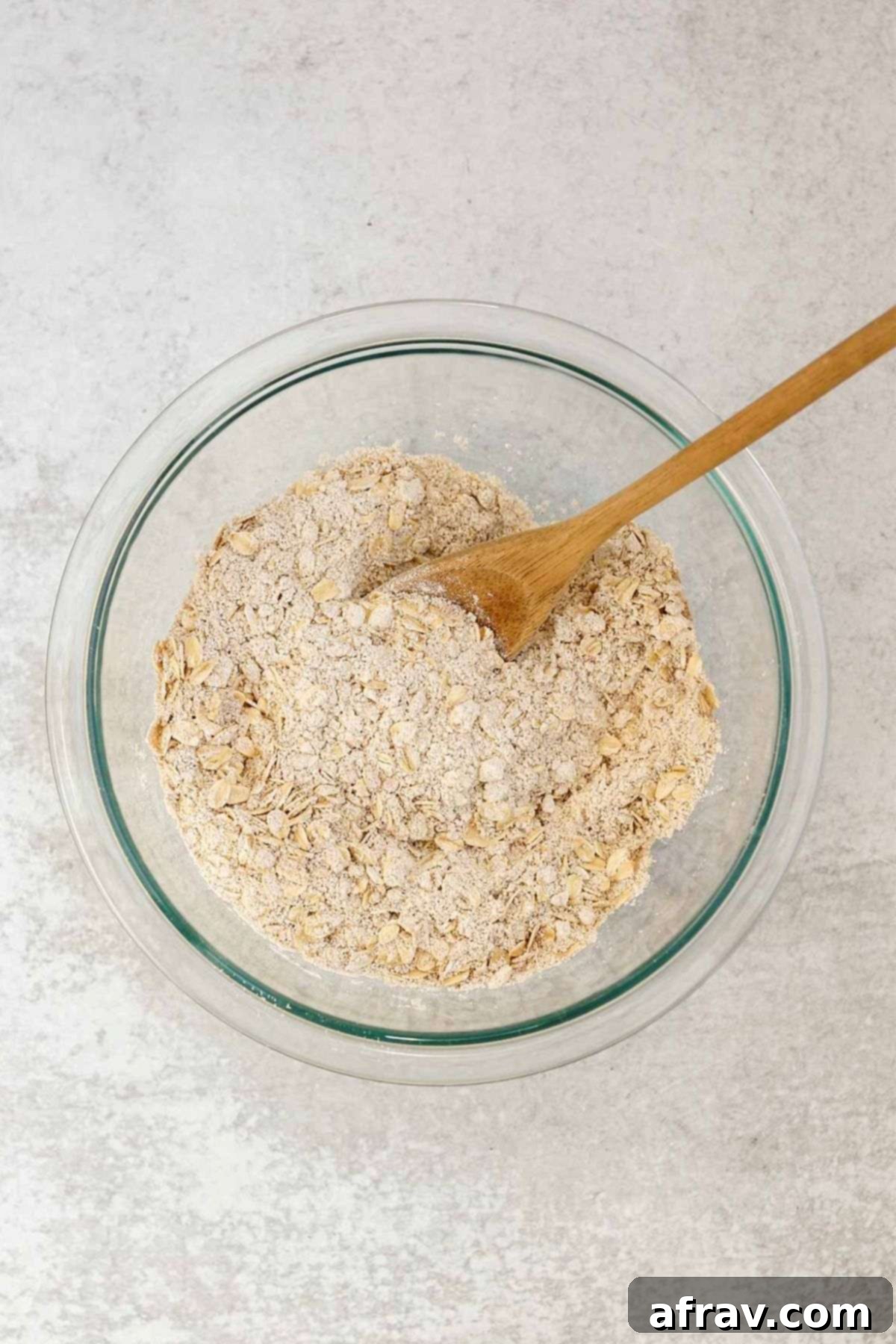
Step 1: Begin by preparing your dry ingredients. In a medium-sized mixing bowl, thoroughly combine the oat flour, old-fashioned oats, baking powder, ground cinnamon, ground nutmeg, and fine sea salt. Whisk them together until they are evenly distributed. This ensures that the leavening agents and spices are well incorporated throughout the dough.
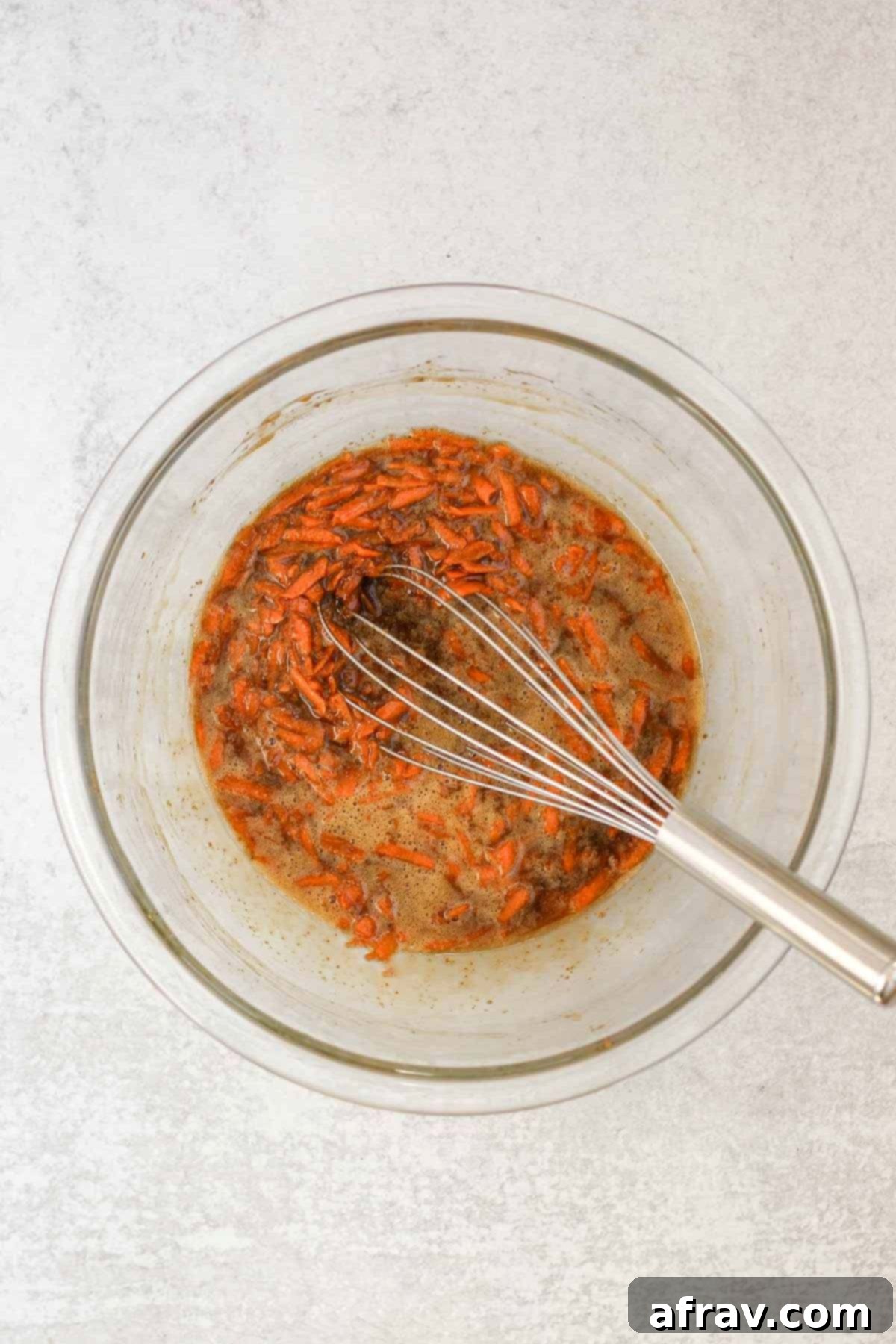
Step 2: In a separate, larger mixing bowl, prepare your wet ingredients. Whisk together the melted coconut oil, coconut sugar, large egg (at room temperature for better emulsion), and pure vanilla extract until smooth. Once combined, gently fold in the freshly grated carrots. Ensure the carrots are evenly mixed throughout the liquid mixture.
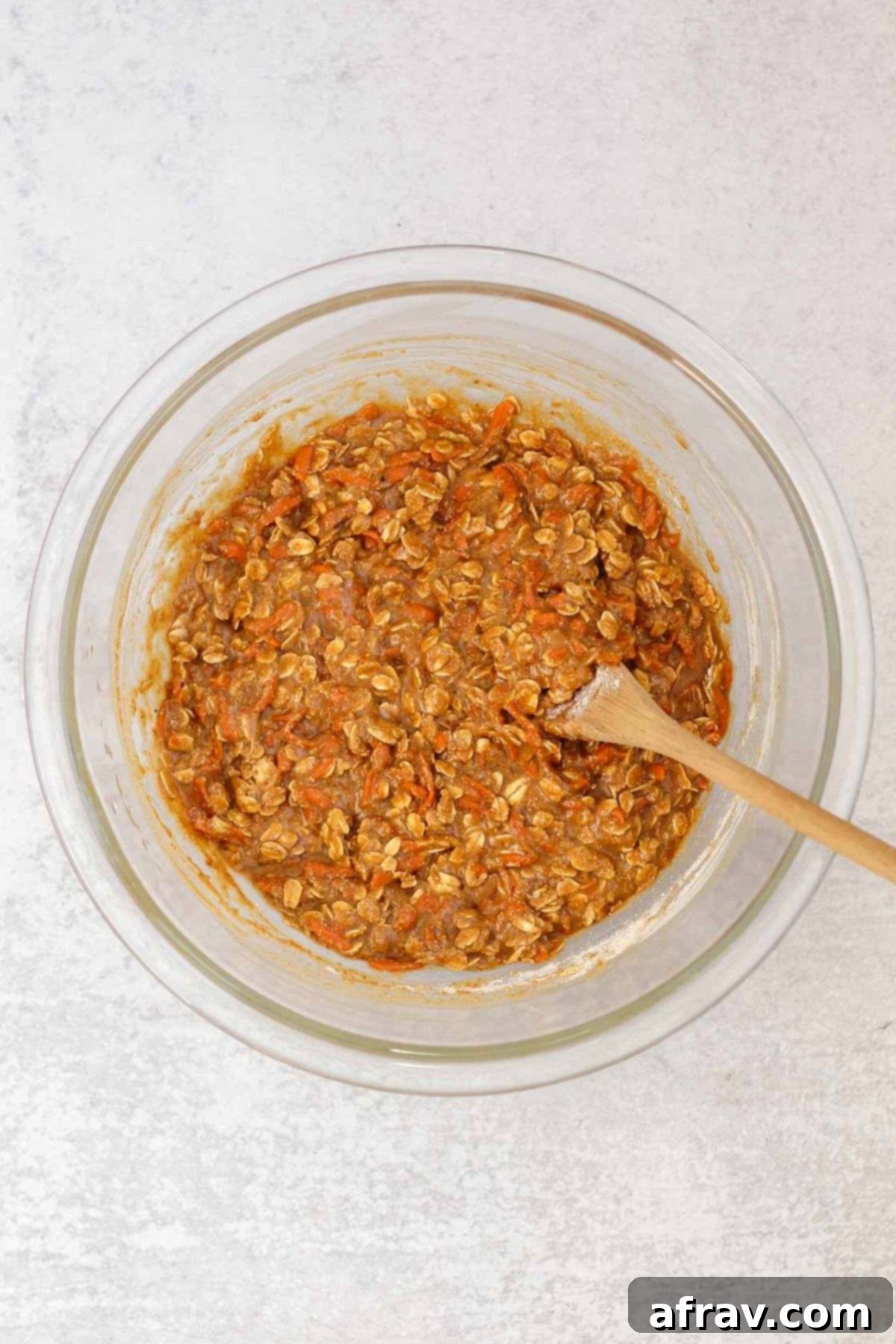
Step 3: Now, it’s time to bring the two mixtures together. Gradually add the dry ingredients from the small bowl into the large bowl containing the wet ingredients. Mix until just combined. Be careful not to overmix; overmixing can lead to tougher cookies. Once the dough comes together, cover the bowl and allow the dough to rest for at least 15 minutes. This crucial step helps the oat flour and oats absorb moisture, preventing the cookies from spreading too much and ensuring a chewy texture.
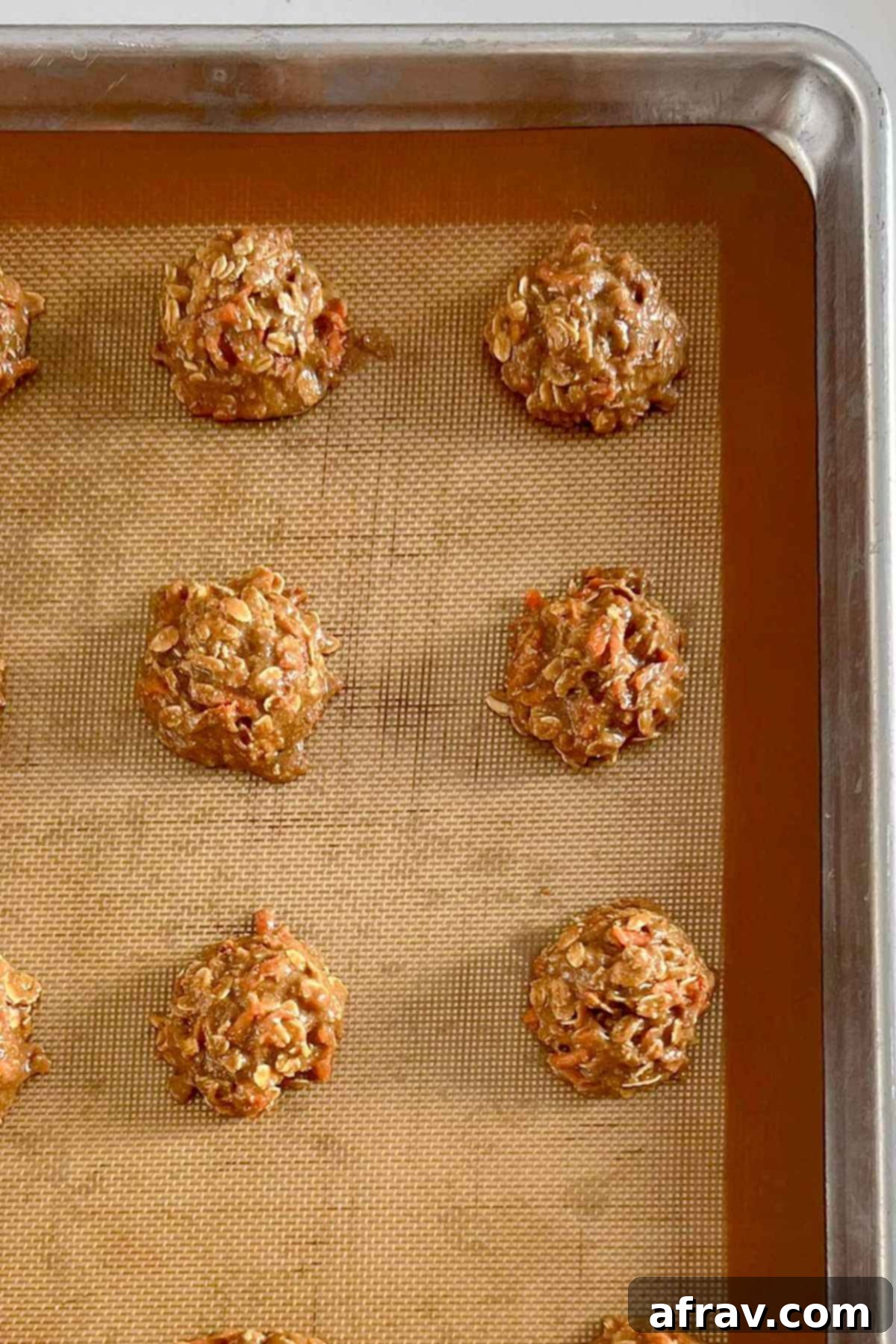
Step 4: Preheat your oven to 350°F (175°C) and line a baking sheet with parchment paper or a silicone baking mat. Using a 2-tablespoon cookie scoop, scoop uniform balls of dough onto the prepared cookie sheet. Leave enough space between each cookie for even baking and slight spreading. The dough might feel a little moist, so use your fingers to gently shape the balls if needed to maintain a round form.
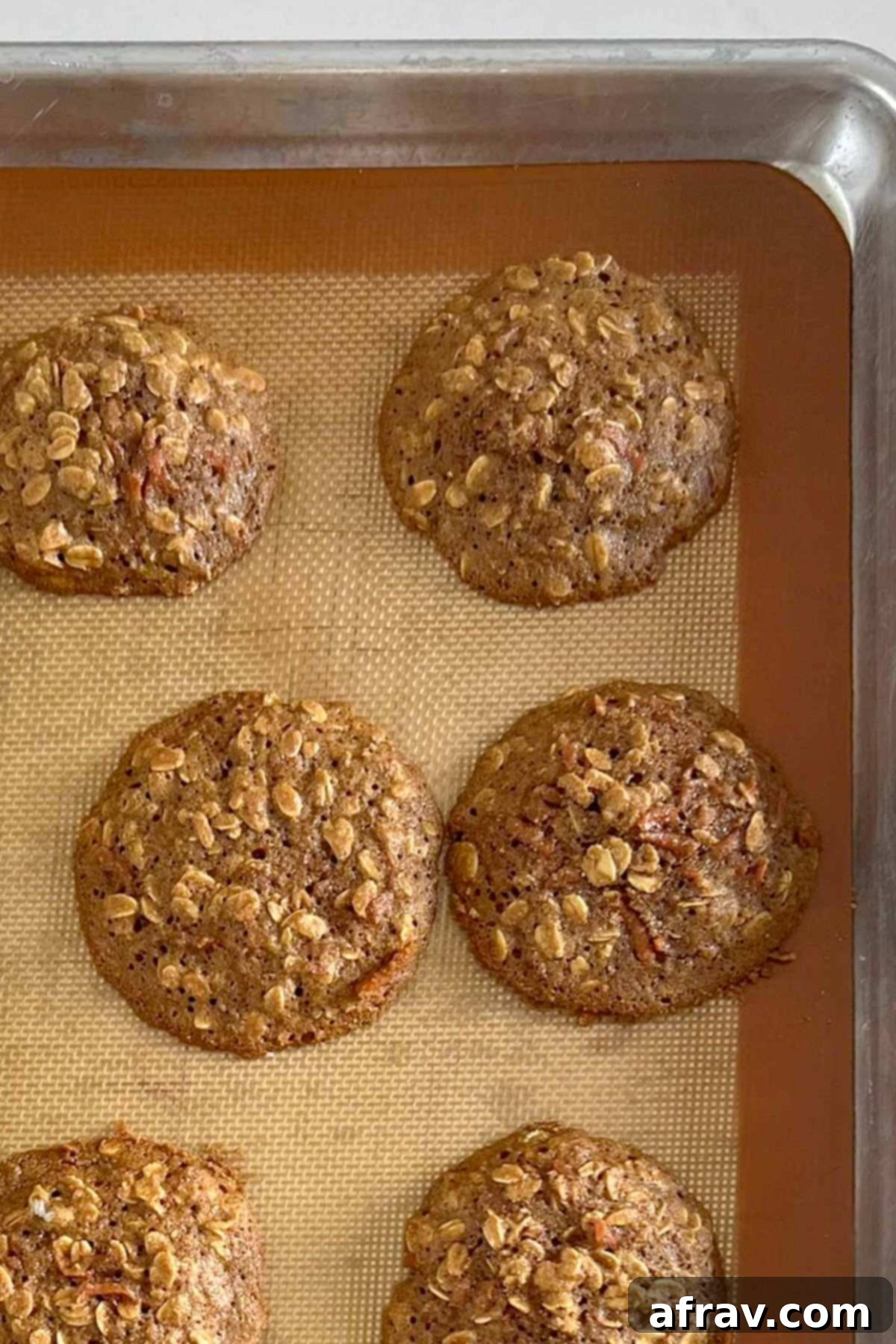
Step 5: Bake the cookies in your preheated oven for 9-11 minutes. Keep a close eye on them; they are ready when the edges are lightly golden brown and the centers appear set. Avoid over-baking, as this can lead to dry cookies. Once baked, remove the baking sheet from the oven and allow the cookies to cool on the pan for a few minutes before transferring them to a wire rack to cool completely. This initial cooling helps them firm up.
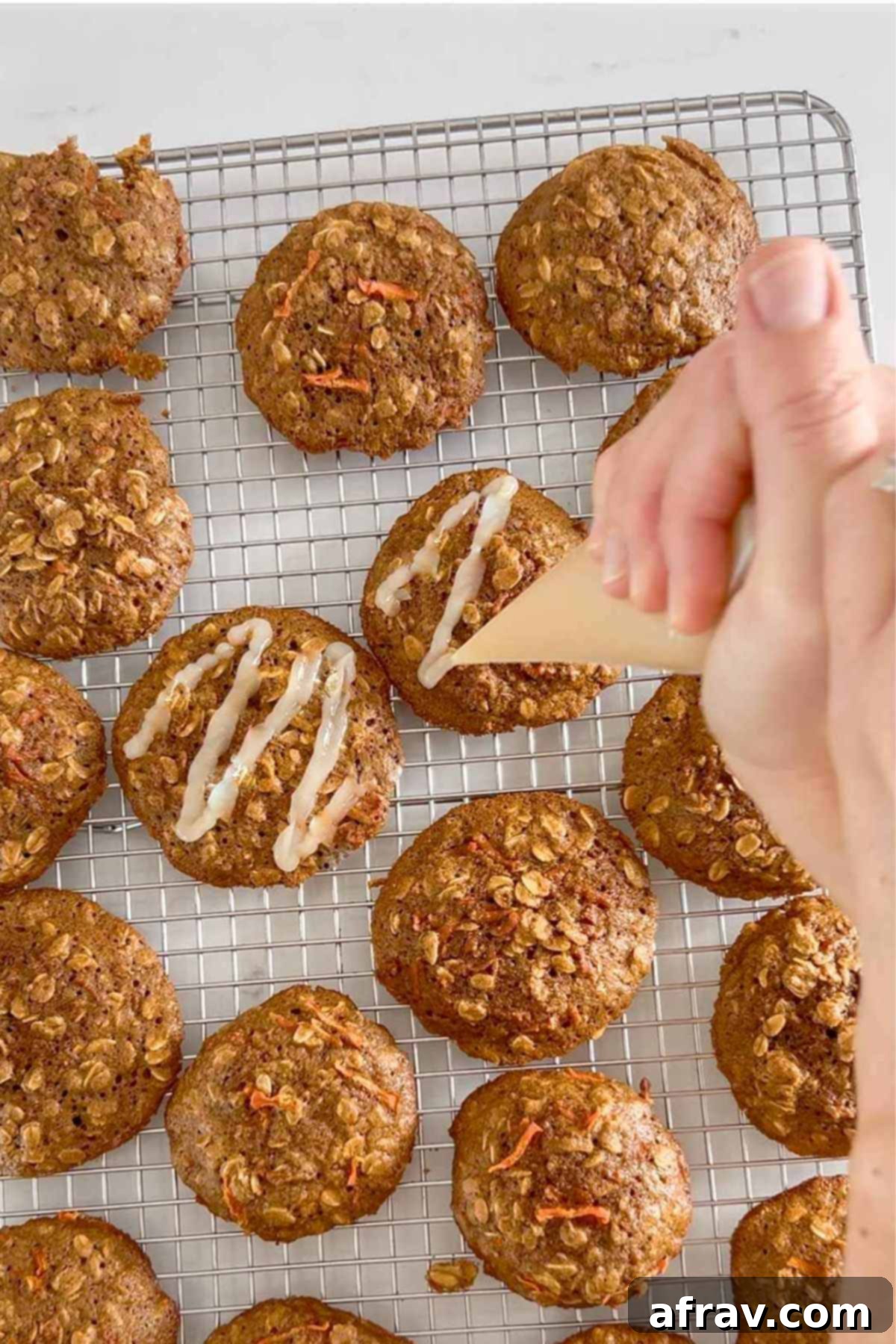
Step 6: Once your cookies have cooled completely on the wire rack, you can proceed with the optional coconut butter glaze/frosting. Prepare the glaze as instructed in the recipe card below and drizzle or spread it generously over each cookie. The glaze will set as it cools, adding a beautiful finish and an extra layer of flavor to your wholesome treats.
Expert Tips for Baking the Best Carrot Cake Oatmeal Cookies
Achieving bakery-quality carrot cake oatmeal cookies at home is easy with these insider tips:
Allow the Dough to Rest for 10-15 Minutes: This step is crucial, especially when working with oat flour. Oat flour lacks the gluten structure found in wheat flour, which typically provides elasticity and prevents excessive spreading. By allowing the dough to rest, the oats and oat flour have ample time to fully absorb the moisture from the wet ingredients. This leads to a more stable dough, resulting in cookies with a perfectly chewy texture that hold their shape beautifully during baking, rather than spreading too thin.
Always Use Freshly Grated Carrots: This is a game-changer for carrot cake cookies. Pre-shredded carrots, often found in bags at the grocery store, tend to be drier and thicker, and they don’t integrate as well into the cookie dough. Freshly grated carrots, on the other hand, release more natural moisture, contributing to a softer, more flavorful cookie. They also bake down more tenderly, becoming almost undetectable in texture while providing all that lovely carrot flavor and sweetness.
Let Cookies Cool on the Baking Pan Before Moving: When these oatmeal cookies first emerge from the oven, they are incredibly delicate and prone to breaking. Their soft, cake-like texture makes them fragile. Resist the urge to move them immediately! Allowing them to cool on the baking sheet for at least 5-10 minutes gives them time to set and firm up. This makes them much easier to transfer to a wire cooling rack without falling apart, ensuring they maintain their perfect shape.
Measure Oat Flour Accurately: Precision in measuring dry ingredients, especially flours, is key to successful baking. When measuring oat flour, do not scoop directly from the bag with your measuring cup, as this can compact the flour and lead to an over-measurement. Instead, gently spoon the oat flour into your measuring cup until it’s overflowing, then use the back of a knife or a straight edge to level it off. Using too much flour will result in a dry, crumbly cookie, while using the correct amount will yield that desirable soft and moist texture.
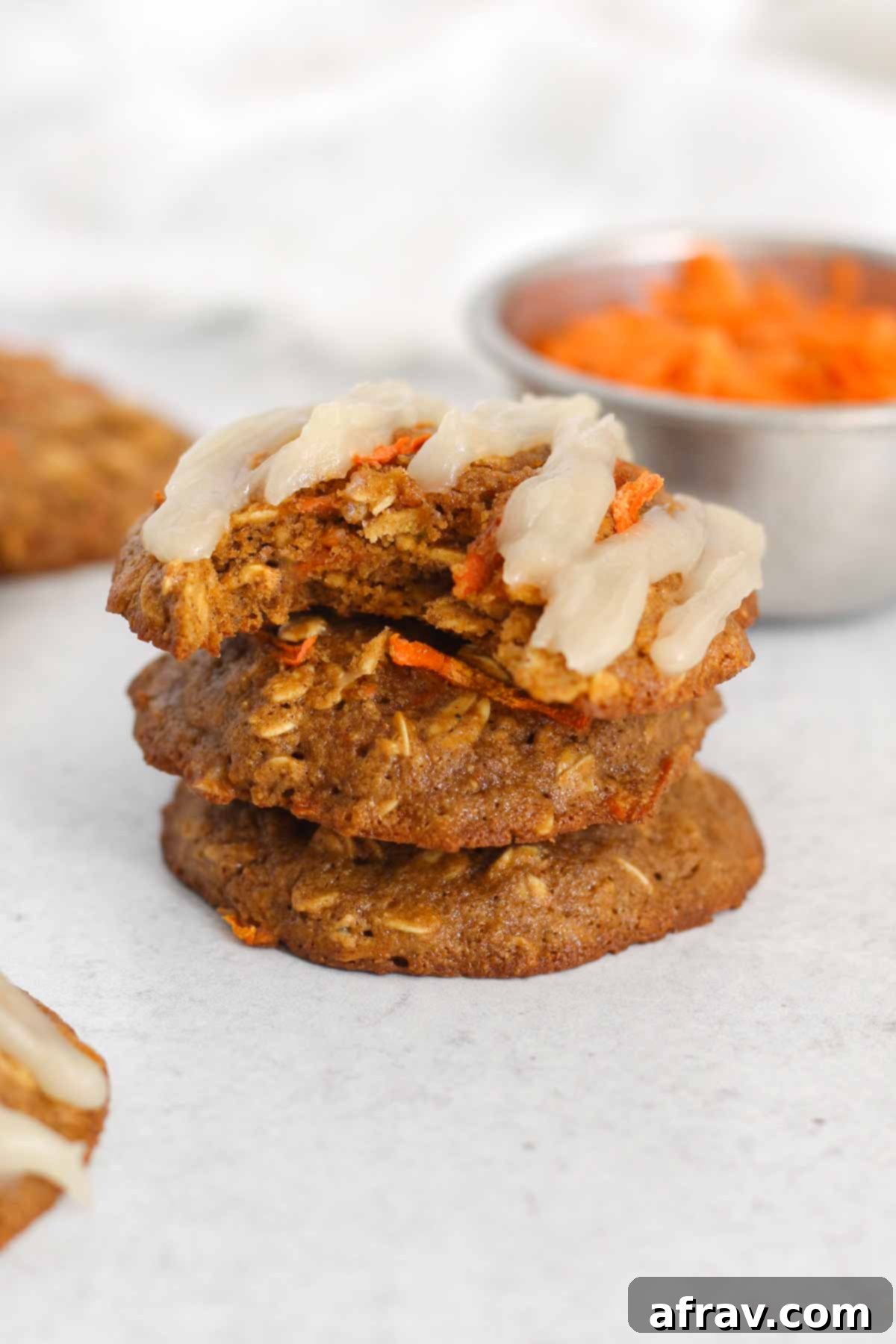
Frequently Asked Questions About Carrot Cake Oatmeal Cookies
We’ve gathered some common questions to help you master this delicious recipe.
While it’s not strictly necessary, as carrot skin is perfectly edible and contains nutrients, peeling the carrots before grating is highly recommended for these cookies. Peeling results in a smoother, more uniform texture in the finished cookie and can also contribute to a slightly sweeter flavor profile since the outermost layer of the carrot can sometimes be a bit bitter. If you prefer, a good scrub is sufficient, but for the best texture, peel them.
The term “healthy” is indeed subjective and can vary based on individual dietary needs and definitions. However, these carrot cake oatmeal cookies are unequivocally a much “healthier” choice compared to their traditional counterparts. They are made with whole grains (oats and oat flour), which provide fiber and sustained energy, and they are minimally and naturally sweetened with coconut sugar, avoiding refined white sugars. They also feature beneficial fats from coconut oil and the inherent nutrients from fresh carrots. While they are still a treat, they are packed with better-for-you ingredients that support a clean eating lifestyle.
You *can* technically use quick-cooking oats as a substitute for old-fashioned oats in this recipe, but it’s not highly recommended for the best results. Quick-cooking oats are processed to be thinner and cook faster, meaning they absorb liquids more rapidly and can lead to a slightly different texture in baked goods. Your cookies might turn out less hearty, a bit more crumbly, and not as chewy as they would with old-fashioned rolled oats. For the ideal soft and chewy texture, sticking with old-fashioned/rolled oats is your best bet.
Storing Your Carrot Cake Oatmeal Cookies for Lasting Freshness
To enjoy the delightful taste and texture of your carrot cake oatmeal cookies for as long as possible, proper storage is key.
These cookies are truly at their peak deliciousness within the first 48 hours after baking, when they are at their softest and chewiest. However, they maintain their freshness wonderfully when stored correctly. To keep them fresh for up to 5 days, place them in an airtight container at room temperature on your kitchen counter. This prevents them from drying out and helps preserve their tender crumb.
For longer storage, these cookies freeze exceptionally well! To freeze them, first ensure they are completely cooled. Then, arrange them in a single layer on a baking sheet and flash freeze for about 30 minutes until firm. Once firm, transfer them to a freezer-safe container, separating layers of cookies with parchment paper to prevent them from sticking together. They can be frozen for up to 3 months. To enjoy, simply thaw them at room temperature or warm them slightly in the microwave for a fresh-baked feel.
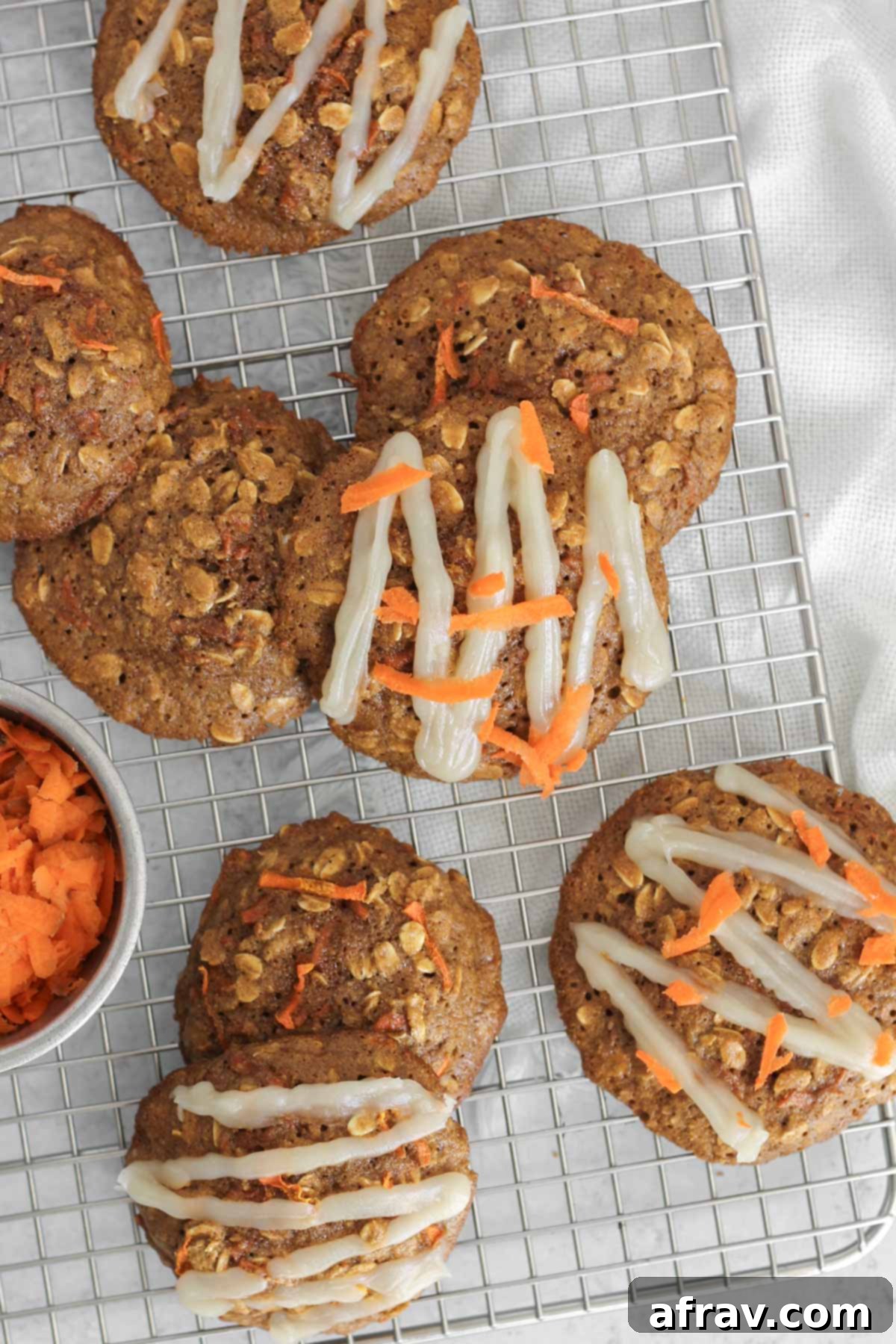
Explore More Wholesome Cookie Recipes!
If you loved these healthy carrot cake oatmeal cookies, you’re in for a treat! Here are more delicious, better-for-you cookie recipes from our kitchen that you absolutely must try. Each one is crafted with clean ingredients and designed to delight your taste buds.
- Healthy Samoa Cookies
- Oat Flour Chocolate Chip Cookies
- Healthy Oatmeal Breakfast Cookies
- Coconut Macaroons without Condensed Milk
If you make this amazing Carrot Cake Oatmeal Cookies recipe, we would absolutely love to hear from you! Please let us know what you think by leaving a star rating and/or comment below. Your feedback helps our community of clean eaters. And don’t forget to share a photo of your delicious creations on Instagram or Facebook and be sure to mention @CleanPlateMama! We love seeing your healthy baking adventures.
Eat Clean. Be Well!
-Sara

Carrot Cake Oatmeal Cookies
Print
Pin
Rate
Save This Recipe For Later!
We’ll email this post to you, so you can come back to it later. Plus, enjoy weekly clean eating recipes as a bonus.
Equipment
-
2 mixing bowls
-
1 cookie sheet
Ingredients
For the Cookies
- 1 cup old-fashioned/rolled oats (certified gluten free, if needed)
- 1 cup oat flour (certified gluten free, if needed)
- 2 tsp. baking powder
- 1 ½ tsp. ground cinnamon
- ¼ tsp. ground nutmeg
- ¼ tsp. fine sea salt
- ½ cup coconut sugar
- ¼ cup coconut oil, melted
- 1 large egg, room temperature
- 1 tsp. pure vanilla extract
- ½ cup freshly grated carrots
For the Coconut Butter Glaze (optional)
- ½ cup coconut butter
- 3 tbsp. pure maple syrup
- almond milk, to thin (any non-dairy milk can be used)
Instructions
For the Cookies
-
Preheat oven to 350-degrees F. Line a baking sheet with parchment paper, or a silicone baking mat, and set aside.
-
In a small/medium sized mixing bowl, combine the oats, oat flour, baking powder, cinnamon, nutmeg, and salt.
-
In a large mixing bowl, whisk together the coconut sugar, coconut oil, egg, and vanilla extract. Then mix in the shredded carrots.
-
Add the dry ingredients to the bowl with the wet ingredients and mix until fully combined. Allow mixed dough to sit for 10 minutes before scooping onto the baking sheet (see notes).
-
Using a 2 tablespoon spring-loaded cookie scoop, drop dough onto the prepared cookie sheet. The dough will still be a little wet, so feel free to use your fingers to help keep a round shape in the dough balls.
-
Bake for 9-11 minutes, or until the edges are lightly brown and the centers are set. Allow to cool slightly on baking sheet and then transfer to a wire cooling rack and let cool completely.
For the Coconut Butter Glaze
-
In a microwave safe dish, microwave the coconut butter until soft/just slightly melted. This should only take 15, or so, seconds.
-
Stir the soften coconut butter until smooth and then mix in the maple syrup – this will thicken the glaze. Add non-dairy milk, 1 tsp. at a time, until it’s thin enough to spread/drizzle over cookies (I like mine to be on the thicker side).
-
You can either drizzle with a spoon, or add using a piping bag or plastic baggie. Glaze will harden as it sets.
Notes
- Let your dough chill for 10-15 minutes -it gives the oats and oat flour time to soak up moisture so your cookies come out nice and chewy and don’t spread too much.
- Feel free to use a classic cream cheese frosting on these cookies too – the cookies are soft, so just be careful when frosting them (use a piping bag/plastic bag to help).
- Here is the coconut butter that I use.
- Nutritional information does not include the optional glaze.
Nutrition
